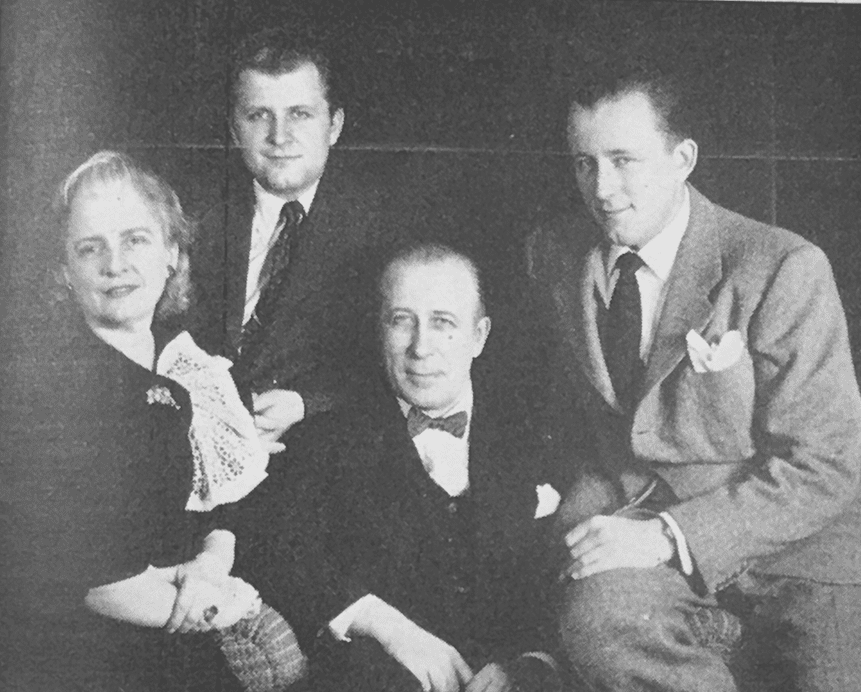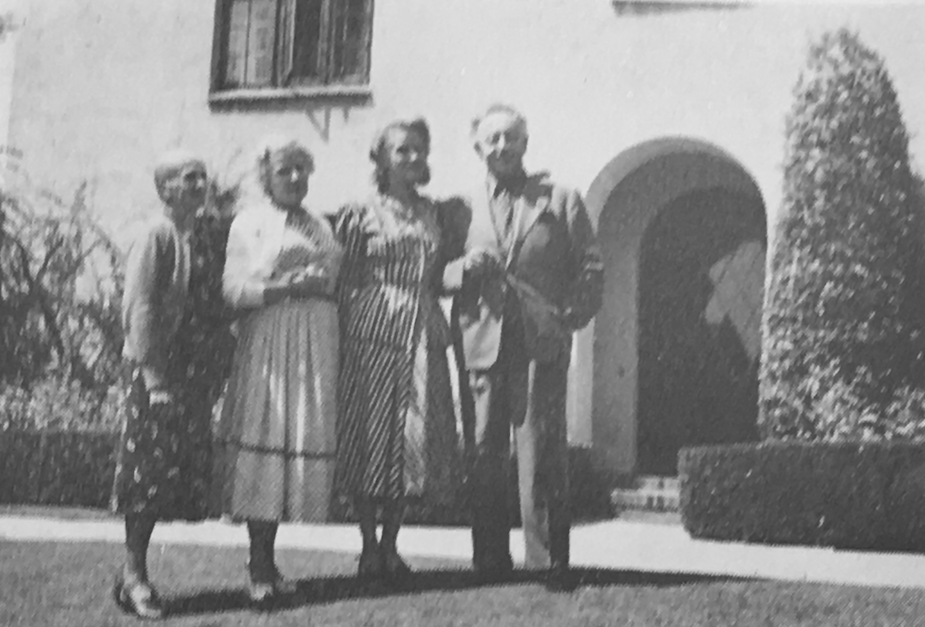Wanda Młynarski Labunski and Wiktor Labunski came to Our Town with their two sons in 1937, 17 years after their marriage and nine years after they arrived in The United States. For the couple and many of their relatives, the desire to lead a life focused on music and culture was overshadowed by the wars of the first half of the 20th century.
Wanda was born in Lithuania. Her family was Polish. Her father was Emil Młynarski, a well-known conductor, violinist, and composer. He had served as a director and conductor of the Warsaw State Opera and was also a founder of the Warsaw Philharmonic. The Młynarskis were at their home in Lithuania at the beginning of World War I. They spent the war years in Moscow, where Wanda met Wiktor. Born in St. Petersburg, Russia, he was the son of Lydia and Stanislaw Labunski and the younger brother of Felix Labunski, the Polish-born, French-trained composer. Lydia was a pianist. Stanislaw was an engineer and an amateur basso. Felix and Wiktor both studied at the St. Petersburg Conservatory. Wiktor served first as a lieutenant in the Russian army during World War I and then became a member of the Polish army.

The musical Labunskis: Dr. Wiktor Labunski, director of the Conservatory of Music, is flanked by Mrs. Labunski and son Stanislaw. Behind his parents is Bronislaw, the younger son. This informal photograph was made for her mother, recently arrived from Poland, and for her sister, Mrs. Artur Rubinstein. (Reprinted from the March 29, 1947 issue of The Independent.)
Wanda and Wiktor married in Warsaw, Poland, in 1920. That year, Wiktor became head of the piano department at the University of Krakow in Poland. Both of their sons, Stanislaw and Bronislaw, (who was also known as Stephen), were born in Poland. The family remained there until 1928, when Wiktor made his American debut at Carnegie Hall in New York City and joined the faculty of the newly formed Nashville Conservatory, becoming head of its piano department. In 1931, Wiktor accepted a position as the director of the Memphis College of Music. Wanda’s parents, Anna and Emil, spent several years in The United States from 1929 until the early 1930s. During that time, Emil held positions with the Curtis Institute of Music and the Philadelphia Grand Opera Company. They subsequently returned to Warsaw, where Emil died in 1935.
While in Our Town, Wiktor was the head of the piano department at the Conservatory of Music of Kansas City (now the UMKC Conservatory) from 1937 until 1941 and served as its director from 1941 until 1958. Wanda was a piano teacher, often teaching private lessons. She was an accomplished cook, and the Labunskis were enthusiastic about hosting parties, frequently including students on their guest lists.
Wanda was one of several siblings. Her sister Aniela, (known as Nela), married Artur Rubinstein, the world-renowned pianist. (He was known in most of the English-speaking world as Arthur, but remained Artur to readers of The Independent.) The Rubinsteins were frequent visitors to Kansas City, with Artur playing numerous concerts. The Labunskis remained in Kansas City during World War II, but the events overseas were very much a part of their lives.
Wanda’s brother Bronislaw, a Polish reserve officer, was imprisoned at Starobielsk Camp soon after the commencement of hostilities. Wanda’s mother, Anna, was spending the summer of 1939 at the family’s home in Lithuania, along with her sister and two servants. She remained there until March 1946, moving to a smaller dwelling on the estate as her house was occupied by troops: first Russians, then Germans, and then Russians again. During four years of the war, Anna had no news of family members in America or of her son Bronislaw, until a message from Wanda finally arrived. When Anna left Lithuania, she traveled to Warsaw by boxcar – only to find her home there had been destroyed. In December 1946, Anna came to Kansas City to see Wanda and her family for the first time in 11 years. According to the Kansas City Star, Anna spoke six languages, Wiktor knew five, and at family reunions, the conversation was in Polish. Anna lived with the Rubinsteins in Los Angeles for several years and then with the Labunskis until her death in 1960. By then, only one of the Młynarski siblings, Alina Raue, remained in Poland.

Entrance to the Beverly Hills residence of the Artur Rubinsteins is background for this family picture, l. to r., Mrs. Anna Młynarski, Mrs. Wiktor Labunski, Mrs. Artur Rubinstein, and Mr. Rubinstein. (Reprinted from the September 11, 1948 issue of The Independent.)
Bronislaw’s story has a Hollywood ending: he married Doris Kenyon Sills, an actress, and settled in Beverly Hills, California. His wife’s previous husbands had included Albert Lasker, who is sometimes cited as “the father of modern advertising,” and who founded the Lasker Foundation, which supports medical research with his subsequent wife, Mary. (One of Doris’ fans named her daughter after her – that little girl grew up to be Doris Day.) Bronislaw penned portions of a memoir, The 79th Survivor, about his experiences during World War II. The book was published several years after his death in 1971. Artur, who was an international celebrity, wrote the foreword.
After stepping down as the director of the Conservatory in 1958, Wiktor became professor emeritus and an artist-in-residence, focusing on teaching and other activities. He didn’t confine himself to music or to the Conservatory: he also taught Russian at the Metropolitan Junior College. He also composed music and served as a guest conductor for many orchestras, including the Kansas City Philharmonic. Wanda died in May 1968 at the age of 71. Wiktor’s death was recorded in January 1974.
Featured in the April 30, 2022 issue of The Independent.
By Heather N. Paxton